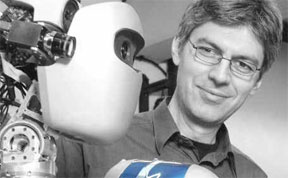video part 1
view at youtube or download video
video part 2
view at youtube or download video
Soft Robotics Design and Control
The talk will summarize main design and control ideas of actively controlled compliant systems using as examples the DLR arms, hands, and the humanoid manipulator Justin. Variable, controllable impedance (stiffness, damping, and mass) is used to optimally adapt the systems to the task and the operating environment. Nonlinear observers and compliant reaction strategies are designed for detecting robot failure or collisions with humans and the environment and thus assure safety of humans in any circumstances during the interaction with the robots.
To characterize these set of robot design and interaction features we coined the term "Soft Robotics". The presented theoretical framework extends the classical impedance control approaches for considering compliance both in the mechanical actuation as well as in the controller and treat both in a unified way.
Inspired by the human musculo-skeletal system, antagonistic, variable compliance actuators are a next logical step towards robots approaching the performance of their biological counterparts. Their control is providing an exciting link to neuroscience by helping to understand human motion principles and validate biological sensory-motor control hypotheses.
The presented approaches are used in space, service, and medical applications, as well as in a new type of industrial robotics focused on skilful assembly and cooperation with humans.
The talk will include practical examples on the use of impedance in some of these fields.
Alin Albu-Schäffer received the Engineering degree from the Technical University Timisoara, Romania and his Ph.D. degree in Control Systems in 2002 from the Technical University of Munich, Germany. Since 1995 he is with the Institute of Robotics and Mechatronics at the German Aerospace Center (DLR). Since 2009 he is heading the Department of Mechatronics Components and Systems. Additionally, he is a lecturer at the Technical University of Munich since 2007. His main research focus is on nonlinear control of mechatronic systems and on the modelling and control of robotic manipulators, in particular of light-weight, torque-controlled robots. These robotic systems have been demonstrated in space, medical and service applications and became commercially available through the robot manufacturer KUKA.
Alin Albu-Schäffer is an associate Editor of the IEEE Transactions on Robotics and Automation and served in the program committee and as area chair for several robotics conferences.
In recognition of his research contributions he and his team received numerous awards, among them the DLR Research Award, best paper awards of the at-Automatisierungstechnik and the Industrial Robot Journal as well as several best paper awards on the main robotics conferences.

